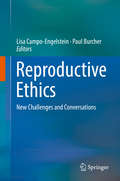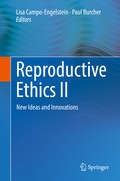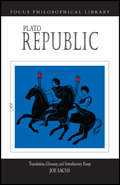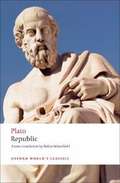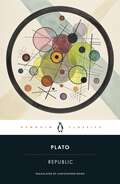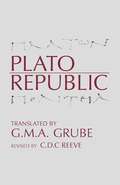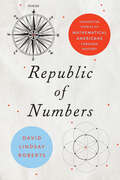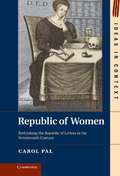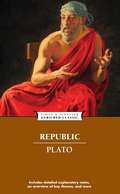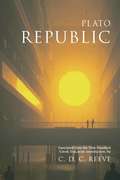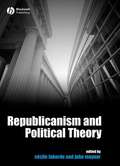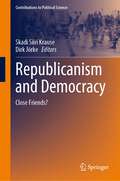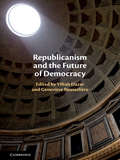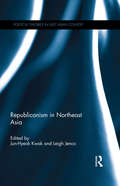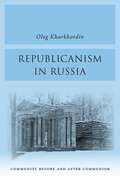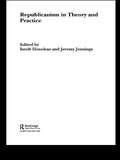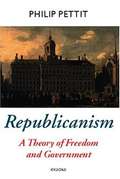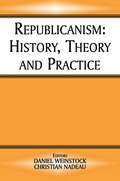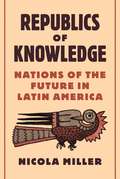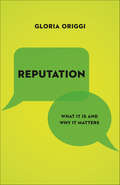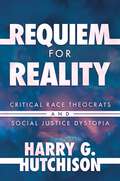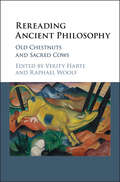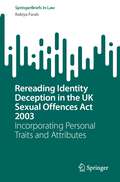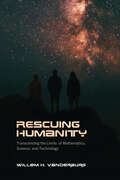- Table View
- List View
Reproductive Ethics
by Lisa Campo-Engelstein Paul BurcherThis book summarizes the contributions at an April 2016 conference held at Albany Medical College, Reproductive Ethics: New Challenges and Conversations. Reproductive ethics does not suffer from a lack of challenging issues, yet a few "hot button" issues such as abortion and surrogacy seem to attract most of the attention, while other issues and dilemmas remain relatively underdeveloped in bioethics literature. The goal of this book is to explore and expand the range of topics addressed in reproductive ethics. This is a multi-disciplinary book bringing together philosophers, clinicians, sociologists, anthropologists, and other scholars whose research or clinical interests touch reproductive issues. The results of this compilation are a comprehensive and unique discussion of the evolving issues in the rapidly changing field. The majority of the popular reproductive ethics anthologies were published at least 10 years ago. The field of reproductive ethics would benefit from a new anthology that addresses some of the perennial dilemmas in reproductive ethics (e. g. abortion, sex selection) from updated perspectives and that also covers new technologies that have emerged only in the last few years, such as social egg freezing.
Reproductive Ethics II: New Ideas and Innovations
by Lisa Campo-Engelstein Paul BurcherThis book is the second collection of essays on reproductive ethics from Drs. Campo-Engelstein and Burcher. This volume is unique in that it is both timely and includes several essays on new technologies, while also being a comprehensive review of most of the major questions in the field, from racial disparities in reproductive healthcare to gene editing and the possibility of the creation of a transhuman species. The scholars writing these essays are pre-eminent in their fields, and their backgrounds are quite varied, including philosophers, anthropologists, physicians, and professors of law. Reproductive ethics remains an underdeveloped area of bioethics despite the recent technological breakthroughs that carry both great promise and potential threats. Building on the first volume of work from a conference held just over one year ago, this new collection of essays from a conference held April 2017 continues this discussion as well as provides ethical insights and reviews of these emerging technologies. The ethical questions swirling around human reproduction are both old and new, but the conference presentations, and the essays derived from them, focus on new ways of appreciating old arguments such as the ethics of abortion, as well as new ways of seeing new technologies such as CRISPR and mitochondrial transfer.
Republic
by Plato John White Joe SachsFocus Philosophical Library's edition of Plato's Republic is an English translation of one of the most intellectually important works in Western philosophy and political theory. It includes an extensive introduction, an extensive afterword "Imitation" by John White, a chapter-by-chapter outline of principal speakers and summary of the content, Stephanus numbers, boldface type to indicate the entrance of a new speaker into the discussion, footnotes, and glossary of key terms with cross-references for the text.This dialogue includes Socrates and others discussing the definition of justice, the theory of forms, and the immortality of the soul. Plato uses numerous dialogues between Socrates and various characters in Athens to discuss the nature of government, including the nature of justice, the happiness of the just and the unjust man, the nature of rule in the ideal city-state, and other matters essential to understanding classical philosophy such as the theory of forms, the immortality of the soul, poetry, and the role of the philosopher in society.FPL books are distinguished by their commitment to faithful, clear, and consistent translations of texts and the rich world part and parcel of those texts.
Republic
by PlatoRepublic is the central work of the Western world's most famous philosopher. Essentially an inquiry into morality, Republic also contains crucial arguments and insights into many other areas of philosophy. It is also a literary masterpiece: the philosophy is presented for the most part for the ordinary reader, who is carried along by the wit and intensity of the dialogue and by Plato's unforgettable images of the human condition. This new, lucid translation by Robin Waterfield is complemented by full explanatory notes and an up-to-date critical introduction.
Republic
by PlatoAn authoritative new translation of Plato's The Republic by Christopher Rowe, with notes and an introduction.'We set about founding the best city we could, because we could be confident that if it was good we would find justice in it' The Republic, Plato's masterwork, was first enjoyed 2,400 years ago and remains one of the most widely-read books in the world: as a foundational work of Western philosophy, and for the richness of its ideas and virtuosity of its writing. Presented as a dialogue between Plato's teacher Socrates and various interlocutors, it is an exhortation to philosophy, inviting its readers to reflect on the choices to be made if we are to live the best life available to us. This complex, dynamic work creates a picture of an ideal society governed not by the desire for money, power or fame, but by philosophy, wisdom and justice.Christopher Rowe's accurate and enjoyable new translation remains faithful to the many variations of the Republic's tone, style and pace. This edition also contains a chronology, further reading, an outline of the work's main arguments and an introduction discussing Plato's relationship with Socrates, and the Republic's style, ideas and historical context.
Republic (Hackett Classics)
by PlatoThe revised edition of Grube's classic translation follows and furthers Grube's noted success in combining fidelity to Plato’s text with natural readability, while reflecting the fruits of new scholarship and insights into Plato's thought since publication of the first edition in 1974. A new introduction, index, and bibliography by Professor Reeve are included in this new rendering.
Republic of Numbers: Unexpected Stories of Mathematical Americans through History
by David Lindsay RobertsThis fascinating narrative history of math in America introduces readers to the diverse and vibrant people behind pivotal moments in the nation's mathematical maturation.Once upon a time in America, few knew or cared about math. In Republic of Numbers, David Lindsay Roberts tells the story of how all that changed, as America transformed into a powerhouse of mathematical thinkers. Covering more than 200 years of American history, Roberts recounts the life stories of twenty-three Americans integral to the evolution of mathematics in this country. Beginning with self-taught Salem mathematician Nathaniel Bowditch's unexpected breakthroughs in ocean navigation and closing with the astounding work Nobel laureate John Nash did on game theory, this book is meant to be read cover to cover. Revealing the marvelous ways in which America became mathematically sophisticated, the book introduces readers to Kelly Miller, the first black man to attend Johns Hopkins, who brilliantly melded mathematics and civil rights activism; Izaak Wirszup, a Polish immigrant who survived the Holocaust and proceeded to change the face of American mathematical education; Grace Hopper, the "Machine Whisperer," who pioneered computer programming; and many other relatively unknown but vital figures. As he brings American history and culture to life, Roberts also explains key mathematical concepts, from the method of least squares, propositional logic, quaternions, and the mean-value theorem to differential equations, non-Euclidean geometry, group theory, statistical mechanics, and Fourier analysis. Republic of Numbers will appeal to anyone who is interested in learning how mathematics has intertwined with American history.
Republic of Women: Rethinking the Republic of Letters in the Seventeenth Century
by Carol PalRepublic of Women recaptures a lost chapter in the narrative of intellectual history. It tells the story of a transnational network of female scholars who were active members of the seventeenth-century republic of letters and demonstrates that this intellectual commonwealth was a much more eclectic and diverse assemblage than has been assumed. These seven scholars - Anna Maria van Schurman, Princess Elisabeth of Bohemia, Marie de Gournay, Marie du Moulin, Dorothy Moore, Bathsua Makin and Katherine Jones, Lady Ranelagh - were philosophers, schoolteachers, reformers and mathematicians. They hailed from England, Ireland, Germany, France and The Netherlands. And together with their male colleagues - men like Descartes, Huygens, Hartlib and Montaigne - they represented the spectrum of contemporary approaches to science, faith, politics and the advancement of learning. Carol Pal uses their collective biography to reconfigure the intellectual biography of early modern Europe, offering a new, expanded analysis of the seventeenth-century community of ideas.
Republic: Book Vii (Enriched Classics)
by PlatoWidely acknowledged as his most influential work, Republic presents Plato's philosophical views on the nature of justice and his vision for the ideal state. THIS ENRICHED CLASSIC EDITION INCLUDES: A concise introduction that gives the reader important background information A chronology of the author's life and work A timeline of significant events that provides the book's historical context An outline of key themes to guide the reader's own interpretations Detailed explanatory notes Critical analysis and modern perspectives on the work Discussion questions to promote lively classroom and book group interaction A list of recommended related books and films to broaden the reader's experience Simon & Schuster Enriched Classics offer readers affordable editions of great works of literature enhanced by helpful notes and insightful commentary. The scholarship provided in Enriched Classics enables readers to appreciate, understand, and enjoy the world's finest books to their full potential.
Republic: Critical Essays (Hackett Classics)
by Plato C. D. ReeveThis edition includes a select bibliography, a synopsis of each book, a glossary of terms, a glossary and index of names, and a general index. "Reeve's new translation of Republic is the one to order for students. . . . Reeve draws on his thorough understanding of Plato's central work to provide an informed translation and properly brief supporting apparatus. A highlight is the concise, substantive Introduction that usefully encapsulates much of Reeve's own scholarship." —P.W. Wakefield, in CHOICE
Republicanism And Political Theory
by Cecile Laborde John Maynor"Republicanism and Political Theory" is the first book to offer a comprehensive survey of republican political theory. Critically assessing the historical credentials, conceptual coherence and normative proposals of republicanism, it brings together original contributions from leading international scholars. The volume focuses on four main areas: liberty in the republican tradition; freedom as non-domination and its critics; the borders of republicanism; and new republican debates, reflecting upon the contribution that republicans have made to our understanding of political life. Individual chapters are closely related to one another, providing readers with valuable insight into the main debates taking place between republicans and their critics. An essential text for students in political theory and political science, this volume also serves as an invaluable resource for research scholars in political philosophy, intellectual history, law, international relations, European studies, and gender studies.
Republicanism and Democracy: Close Friends? (Contributions to Political Science)
by Skadi Siiri Krause Dirk JörkeThis book discusses whether democracy and republicanism are identical, complementary, or contradicting ideas. The rediscovery of classic republicanism a few decades ago made it clear how profoundly modern notions of democracy had been shaped by the republican tradition. But defining these two concepts remains difficult, and the views diverge widely. The overarching aim of this book is to discuss the extent to which democracy and republicanism are identical, complementary or mutually contradicting ideals / ideas. Pursuing this open approach to the subject means calling into question a widely used formula according to which modern democracy is composed of liberal principles such as individualism, the rule of law and human rights, on the one hand, and of republican principles such as focusing on the common good and popular sovereignty, on the other. This book will appeal to students, researches, and scholars of political science interested in a better understanding of political theory and political history.
Republicanism and the Future of Democracy
by Yiftah Elazar Geneviève RousselièreDemocracies are in crisis. Can republican theory contribute to reforming our political norms and institutions? The 'neo-republican turn' has seen scholars using the classical republican tradition in reconstructing and developing a vision of public life as an alternative to liberalism. This volume offers new perspectives from leading scholars on how republicanism can help transform democratic theory and respond to some of its most pressing challenges. Drawing on this recent revival of republican political thought, its chapters reflect on such issues as the republican definition of freedom as nondomination and its relation to democracy and populism, the ideal of the common good, domination in the workplace and in the family, republicanism in a globalized world, and radical republican politics. It will appeal to researchers and students in political theory, political philosophy and the history of ideas, and anyone interested in gaining greater insight into the prospects and challenges of republican democracy in today's world.
Republicanism in Northeast Asia (Political Theories in East Asian Context)
by Jun-Hyeok Kwak Leigh JencoAs rapid economic development brings increasing uncertainty in East Asia, interest in a new version of republicanism, termed iscalled neo-Roman republicanism, is growing across the region. Conceptualized as liberty as non-domination, this new form of republicanism has inspired not only Western but also East Asian political theorists. However, neo-Roman republican ideas in Northeast Asian countries continue to face serious conceptual and political challenges, which scholarly literature on both republicanism and on East Asian politics has largely failed to confront. This book addresses these challenges by surveying the latest theoretical contributions to the studies of republicanism in Western countries and the latest interpretations of how republicanism, including both communitarian republicanism and neo-Roman republicanism, has been appropriated in countries in East Asia. In particular, it deals with the key question of whether liberty as non-domination can work in non-Western contexts where the fundamental tenets of liberal democracy, such as moral individualism and value pluralism, do not predominate. Across three sections, the chapters first provide a conceptual overview of republicanism as a global political theory, they then consider how republicanism has historically been received, resisted, and translated into East Asia., and Ffinally, they examine how historically informed possibilities fit with the emergent needs of contemporary Northeast Asian societies. Overall, the contributors show that republicanism is an always-ongoing project, whose terms must be interpreted and translated into the various communities they inform. Normative considerations about whether or how republicanism applies in East Asia cannot be divorced from historical and empirical approaches which consider the various ways in which republican ideals reflect the realities of life there. Dealing with the issue of republicanism from a new, comparative perspective, this book will have broad appeal to students and scholars of Asian studies, comparative political theory, political philosophy, sociology, and history.
Republicanism in Russia: Community Before and After Communism
by Oleg KharkhordinMarxism was the loser in the Cold War, but Oleg Kharkhordin is not surprised that liberal democracy failed to take root after the Soviet Union’s dissolution. He suggests that Russians find a path to freedom by looking to the classical tradition of republican self-government and civic engagement already familiar from their history and literature.
Republicanism in Theory and Practice: Confronting Theory And Practice (Routledge/ECPR Studies in European Political Science #Vol. 41)
by Iseult Honohan Jeremy JenningsRecent claims that civic republicanism can better address contemporary political problems than either liberalism or communitarianism are generating an intense debate. This is a sharp insight into this debate, confronting normative theory with historical and comparative analysis. It examines whether republican theory can address contemporary political problems in ways that are both valuable and significantly different in practice from liberalism. These expert authors offer contrasting perspectives on issues raised by the contemporary revival of republicanism and adopt a variety of methodological approaches to address the practical implications of republican thought within a coherent thematic framework. This book also *clarifies core themes and contested areas of republican thought, especially the notion of liberty, the specific political institutions needed to realize it, and the nature of solidarity among citizens. * shows how republicanism continued to influence the development of liberal thought in nineteenth century Britain * examines the development of alternative republican discourses, including the established political practice and ideology of the French republican tradition * applies republican perspectives to contemporary political concerns such as the creation of social trust and the expansion of public accountability * explores the implications of republican theory for policy areas including houses, education and marriage in diverse multicultural societies This book will be of great interest to researchers and students studying republicanism in political science history, social policy and education. In addition, it is a valuable resource for those concerned with citizenship, democratic theory, multiculturalism, nationalism and patriotism, and politics beyond the nation-state.
Republicanism, Rhetoric, and Roman Political Thought
by Daniel J. KapustRepublicanism, Rhetoric, and Roman Political Thought develops readings of Rome's three most important Latin historians – Sallust, Livy and Tacitus – in light of contemporary discussions of republicanism and rhetoric. Drawing on recent scholarship as well as other classical writers and later political thinkers, this book develops interpretations of the three historians' writings centering on their treatments of liberty, rhetoric, and social and political conflict. Sallust is interpreted as an antagonistic republican, for whom elite conflict serves as an outlet and channel for the antagonisms of political life. Livy is interpreted as a consensualist republican, for whom character and its observation helps to maintain the body politic. Tacitus is interpreted as being centrally concerned with the development of prudence and as a subtle critic of imperial rule.
Republicanism: A Theory of Freedom and Government
by Philip PettitThis is the first full-length presentation of a republican alternative to the liberal and communitarian theories that have dominated political philosophy in recent years. The latest addition to the acclaimed Oxford Political Theory series, Pettit's eloquent and compelling account opens with an examination of the traditional republican conception of freedom as non-domination, contrasting this with established negative and positive views of liberty. The first part of the book traces the rise and decline of this conception, displays its many attractions, and makes a case for why it should still be regarded as a central political ideal. The second part of the book looks at what the implementation of the ideal would require with regard to substantive policy-making, constitutional and democratic design, regulatory control and the relation between state and civil society. Prominent in this account is a novel concept of democracy, under which government is exposed to systematic contestation, and a vision of state-societal relations founded upon civility and trust. Pettit's powerful and insightful new work offers not only a unified, theoretical overview of the many strands of republican ideas, but also a new and sophisticated perspective on studies in related fields including the history of ideas, jurisprudence, and criminology.
Republicanism: History, Theory, Practice
by Daniel Weinstock Christian NadeauIn this collection of writings, leading historians of political thought and political theorists provide an overview of traditional and contemporary republicanism. The first part of the book presents studies of ancient and modern versions of republicanism in Athenian and Roman political thought, as well as in Machiavelli and Montesquieu.The second part focuses on some of the key questions that confront contemporary thinkers, such as: * What ought one to expect of a good state and civil society? * What are the conditions for deliberative democracy?* What are the theoretical implications of a republican conception of political liberty?The essays in this volume advance the debate over republicanism, through both a rigorous philosophical investigation of republicanism's main sources and careful analysis of its meaning.
Republics of Knowledge: Nations of the Future in Latin America
by Nicola MillerAn enlightening account of the entwined histories of knowledge and nationhood in Latin America—and beyondThe rise of nation-states is a hallmark of the modern age, yet we are still untangling how the phenomenon unfolded across the globe. Here, Nicola Miller offers new insights into the process of nation-making through an account of nineteenth-century Latin America, where, she argues, the identity of nascent republics was molded through previously underappreciated means: the creation and sharing of knowledge.Drawing evidence from Argentina, Chile, and Peru, Republics of Knowledge traces the histories of these countries from the early 1800s, as they gained independence, to their centennial celebrations in the twentieth century. Miller identifies how public exchange of ideas affected policymaking, the emergence of a collective identity, and more. She finds that instead of defining themselves through language or culture, these new nations united citizens under the promise of widespread access to modern information. Miller challenges the narrative that modernization was a strictly North Atlantic affair, demonstrating that knowledge traveled both ways between Latin America and Europe. And she looks at how certain forms of knowledge came to be seen as more legitimate and valuable than others, both locally and globally. Miller ultimately suggests that all modern nations can be viewed as communities of shared knowledge, a perspective with the power to reshape our conception of the very basis of nationhood.With its transnational framework and cross-disciplinary approach, Republics of Knowledge opens new avenues for understanding the histories of modern nations—and the foundations of modernity—the world over.
Reputation: What It Is and Why It Matters
by Gloria OriggiA compelling exploration of how reputation affects every aspect of contemporary lifeReputation touches almost everything, guiding our behavior and choices in countless ways. But it is also shrouded in mystery. Why is it so powerful when the criteria by which people and things are defined as good or bad often appear to be arbitrary? Why do we care so much about how others see us that we may even do irrational and harmful things to try to influence their opinion? In this engaging book, Gloria Origgi draws on philosophy, social psychology, sociology, economics, literature, and history to offer an illuminating account of an important yet oddly neglected subject.Origgi examines the influence of the Internet and social media, as well as the countless ranking systems that characterize modern society and contribute to the creation of formal and informal reputations in our social relations, in business, in politics, in academia, and even in wine. She highlights the importance of reputation to the effective functioning of the economy and e-commerce. Origgi also discusses the existential significance of our obsession with reputation, concluding that an awareness of the relationship between our reputation and our actions empowers us to better understand who we are and why we do what we do.Compellingly written and filled with surprising insights, Reputation pins down an elusive subject that affects everyone.
Requiem for Reality: Critical Race Theocrats and Social Justice Dystopia
by Harry G. HutchisonCritical Race Theory, like most ideologies before it, promises an earthly paradise premised on ceaseless revolution, but instead of delivering on this promise, it produces a terrestrial hell echoing the inner nihilism of modern life. Contemporary social justice movements, just like progressivism, the New Deal, and post-Civil War Southern Democrats, place Westerners in bondage rather than delivering on the promise of unlimited freedom.Requiem for Reality responds to the widening pendulum shifts of our age. These developments consume and incense the nation. These shifts offer a bewildering set of claims grounded in the presumption that race and other forms of human identity explain all forms of disparity and inequality. Against such claims, it is crucial to distinguish between a development narrative and a bias narrative for the purpose of explaining ethnic disparity. The development narrative is grounded in data that often deliver unwelcome facts. The facts show that Asian Americans, as well as West Indian blacks, often do better than white Americans in schooling, per capita income, and crime rates. Indeed, Syrian Americans, Korean Americans, Indonesian Americans, Taiwanese Americans, and Filipino Americans experience significantly higher median household incomes than whites and higher test scores, lower incarceration rates, and longer life expectancies. Oblivious to such facts, the bias narrative, on the other hand, grounds itself in the &“white privilege&” thesis suggesting that only race matters. Surfacing from the toxic pit of ideology, the bias narrative emphasizes the racist claim that African Americans are the only ethnic group in the world who cannot succeed under less-than-ideal conditions. Separated from important facts, this narrative often substitutes absolute Neo-pagan certainties originating in a make-believe world for commonplace notions of truth and reality. As such, the &“white privilege&” thesis, rather than improving the conditions of African Americans and others, offers a utopian dream that threatens to become a national nightmare. The urgent pursuit of utopia reflects trends that are largely anthropological, sociological, and more spiritual than political. Responding to these developments, which have given rise to victimhood claims within gender and transgender categories will require more than argumentation, rational analysis, superior logic, or even the inauguration of a Hanging Judge. It will require courage because otherwise, Chairman Mao&’s forecast, stating that there is a great disorder under heaven and the situation is excellent, may come true here just like it has already come true for China.
Rereading Ancient Philosophy
by Raphael Woolf Verity HarteThis book revisits, and sheds fresh light on, some key texts and debates in ancient philosophy. Its twin targets are 'Old Chestnuts' - well-known passages in the works of ancient philosophers about which one might have thought everything there is to say has already been said - and 'Sacred Cows' - views about what ancient philosophers thought, on issues of philosophical importance, that have attained the status of near-unquestioned orthodoxy. Thirteen leading scholars respond to these challenges by offering new perspectives on familiar material and challenging some prevailing orthodoxies. On authors ranging from the Presocratics to Plotinus, the book represents a snapshot of contemporary scholarship in ancient philosophy, and a vigorous and illuminating affirmation of its continuing interest and power. The volume is dedicated to Professor M. M. McCabe, an inspiring scholar and teacher, colleague and friend to both the editors and the contributors.
Rereading Identity Deception in the UK Sexual Offences Act 2003: Incorporating Personal Traits and Attributes (SpringerBriefs in Law)
by Rakiya FarahDoes the Sexual Offences Act (SOA) 2003 provide for consent to be vitiated in all the circumstances we think it should? Can, and should, section 76(2)(b) (the impersonation provision) be read to include a different class of identity deceptions? How should the concept of personal identity be understood in this context?While the concept has had some airing in the courts, and the distinction between identity and attributes of the person softened, the law on rape still fails to give proper effect to identity deception and leaves many questions unanswered. This book offers a novel take on the problem of sexual deception. Through meticulous interrogation of the meaning and normative implications of the concept of personal identity, it challenges the law’s restrictive approach and argues that qualitative identity is, like numerical identity, normatively important. This book provides a comprehensive and nuanced analysis of the philosophical, theoretical, and psychological experimental literature on personal identity, marshalling relevant insights to support a broader reading of the impersonation provision. The argumentative thrust of the book is an extended equivalence thesis, which links numerical with qualitative identity. In this task, it engages in capacious exploration of different kinds of impersonation, at each juncture leading the reader to a more permissive understanding. Guided by the principle of consistency, the central thesis is that certain deceptions about personal traits should be unlawful based on existing prohibitions with which there is equivalence. A central contribution of the book is the articulation of a theoretical framework to support a richer understanding of identity, giving due attention to its qualitative aspects. This new framework is applied at stage three of the equivalence thesis to explain the relationship between individual traits and identity change. By implication, a potentially wide scope of consent-vitiating deceptions is endorsed. This presents a challenge to those who would defend more stringent limits. The book thus invites further discussion on the implications of this approach for the law on rape and indicates areas for further research and attention.
Rescuing Humanity: Transcending the Limits of Mathematics, Science, and Technology
by Willem H. VanderburgIn Rescuing Humanity, Willem H. Vanderburg reminds us that we have relied on discipline-based approaches for human knowing, doing, and organizing for less than a century. During this brief period, these approaches have become responsible for both our spectacular successes and most of our social and environmental crises. At their roots is a cultural mutation that includes secular religious attitudes that veil the limits of these approaches, leading to their overvaluation. Because their use, especially in science and technology, is primarily built up with mathematics, living entities and systems can be dealt with only as if their "architecture" or "design" is based on the principle of non-contradiction, which is true only for non-living entities. This distortion explains our many crises. Vanderburg begins to explore the limits of discipline-based approaches, which guides the way toward developing complementary ones capable of transcending these limits. It is no different from a carpenter going beyond the limits of his hammer by reaching for other tools. As we grapple with everything from the impacts of social media, the ongoing climate crisis, and divisive political ideologies, Rescuing Humanity reveals that our civilization must learn to do the equivalent if humans and other living things are to continue making earth a home.
